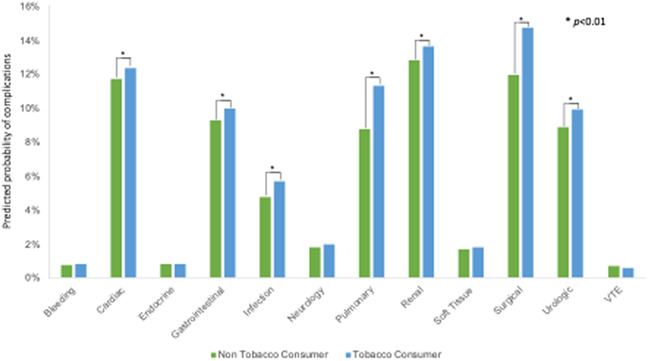Introduction and objectives
Tobacco use has been shown to be an independent risk factor for postoperative morbidity following a variety of major surgeries. While tobacco use is both a risk factor for kidney cancer and associated with worse long-term survival, there is minimal data regarding its association with postoperative complications following nephrectomy.
Methods
We performed a retrospective cohort study of patients undergoing nephrectomy for renal masses between 2003-2017 using the Premier Hospital Database, a discharge dataset representing approximately 20% of non-federal hospitalizations in the United States. Using multivariable logistic regression analyses (MVA), we evaluated the association between tobacco use and the risk of 90-day postoperative complications as defined by the Clavien classification system, adjusting for patient demographics and comorbidities, hospital characteristics, and disease status. We completed subgroup analyses of surgical approach (open vs. minimally-invasive; radical vs. partial), and assessed postoperative complications by system.
Results
108,430 patients were included in the analysis. 34,368 (31.7%) were identified as tobacco consumers, who were more likely to be male and harbor higher comorbidity indices. On MVA, tobacco consumption was associated with a significantly increased risk of minor complications (Clavien grades 1-2, OR 1.17, 95% CI 1.14–1.21) and non-fatal major complications (Clavien grades 3-4, OR 1.28, 95% CI 1.21–1.35), but no difference with respect to postoperative mortality (OR 0.93, 95% CI 0.79–1.11). Similar results were seen on all subgroup analyses by surgical approach. Within complications by system, our analysis demonstrated an association between tobacco use and increased surgical, pulmonary, urologic, infectious, renal, gastrointestinal, and cardiac complications (Figure).
Conclusions
Tobacco consumption is associated with significantly increased risk of minor and non-fatal major postoperative complications in patients undergoing nephrectomy for renal masses regardless of surgical approach, with the strongest association for surgical, pulmonary, and urologic complications. It is therefore appropriate to encourage tobacco cessation among patients planning to undergo kidney surgery in an effort to optimize postoperative outcomes.

Source of Funding
None